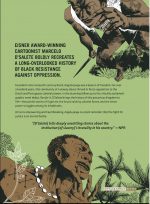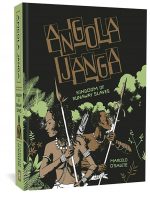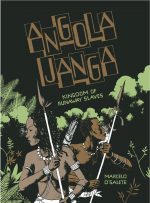


By Marcelo D’Salete, translated by Andrea Rosenberg (Fantagraphics Books)
ISBN: 978-1-68396-191-8 (HB/Digital edition)
Art historian Professor Marcelo D’Salete is one of Brazil’s most respected authors and graphic novelists. Born in 1979 and a graduate of Carlos de Campos College and the University of São Paulo, he currently resides in Italy. Despite this, the majority of his comics examines Brazil’s history of slavery and consequent issues affecting the vast Afro-Brazilian underclass resulting from it.
After freelancing as an illustrator, D’Salete’s first graphic novel Noite Luz was released in 2008, followed by Encruzilhada in 2011. He acquired a greater degree of fame after his 2014 book Cumbe was translated into English by Fantagraphics in 2017: subsequently garnering a boatload of prizes as Run For It: Stories of Slaves Who Fought for their Freedom.
Technically, the professor followed that multi award-winning volume with this even more ambitious tome, but Angola Janga actually took eleven years to complete and its initial release that same year was simply a fortunate convergence…
This epic expands the story of that escaped slave culture, detailing how Palmares Quilombos (“war camps of runaway slaves”) were crushed by colonisers. Before the story opens, Introduction ‘Mocambos and Plantations’ explains how 16th century Portuguese occupiers moved from enslaving local peoples to importing millions of Africans. These supplemented a huge indigenous workforce toiling to exploit timber, sugarcane and other natural resources for ruthless masters on increasingly prolific and profitable plantations.
Over centuries – but largely due to Dutch attempts to seize control from the Portuguese between 1630-1654 – generations of black slaves (designated “units”) in the Pernambuco region had escaped into the forests and Serra da Barriga hills: founding an outlaw nation of semiautonomous settlements: “mocambos”.
By the time events open here, Palmares or Angola Janga (“Little Angola” in Bantu language Kimbundu) comprised an estimated 20,000 free-living rebellious “blacks”, “Indios”, “mulattos” and other demeaning and pointless designations of mixed race all considered to be property not humanity…
This astounding dramatised examination is delivered in brief vignettes torturously following the entwined paths of key individuals like black leaders Soares, Ganga Zumbi and Ganga Zamba, numerous religious and civic figures and Domingos Jorge Velho: pitiless commander of “Paulista” mercenaries hired to reimpose order and crush the beacon of hope Angola Janga represented.
Crafted in stark edgy monochrome with dialogue and narration at a bare minimum, it begins with ‘The Way to Angola Janga’. Each chapter is preceded by pertinent excerpts from contemporary accounts by the victorious colonisers and historians.
In 1673, two frantic runaways crash through trees and brush. Soares was promised freedom by dying plantation owner Mistress Catarina, but her son Gonçalo chose not to honour her wishes and brutally punished the mulatto (“mixed race”) for demanding his Letter of Emancipation. Now he and companion Osenga are fleeing, searching for a mocambo to take them in. Soares’ past is complex and complicated, but common gossip amongst the slave catchers preparing to bring him back…
‘Birth’ wings back to 1655 and the controversial origins of the “half-caste”: revealing connections that have church and military authorities clashing and colluding in a conspiracy of silence, whilst revealing the inner workings and defence strategies of mocambos and their leaders before the fate of Angolan enclave ‘Aqualtune’ introduces more charismatic defenders of liberty in episodes set in 1677…
When Palmares warriors attack white plantations, outraged plantation owners declare implacable war, but instead of engendering alliances, tribal and sibling rivalries undermine the rebels’ unity with catastrophic consequences…
Moreover, devious white masters employ cruel tactics to regain their valuable Units and maintain the status quo: combining religious tyranny, disease, relentless police actions and bounty hunting with spurious offers of amnesty, designated black Reservations and valueless treaties. These slowly chip away at the hidden free kingdoms, as seen in ‘Scars’, ‘Cucaú’ and ‘Encounters’, with even free-born and emancipated blacks experiencing a rise in intolerance, prejudice and white exceptionalism.
Resistance was common and reprisals inescapable. Always the mocambos called to those brave enough to stand up and fight back, but increasingly they were fighting their own kind rather than their oppressors… sometimes, even their own families…
The saga explores a subtext of religious and political beliefs in opposition, complementing the physical and geographical struggle. ‘Savages’ reveals the turbulent and traumatic early years of Domingos Jorge Velho and how white leaders suborned and seduced native tribes like the Oruazes into joining their ‘War’ against Palmares…
Beginning in 1691 the savage strands converge, as raids by belligerent mocambo warriors and sorties to recapture lost slaves reach lethal levels. With the entire region in turmoil, and death toll mounting, many scared officials and churchmen petition for blanket emancipation to end the bloodshed. However, a final clash is imminent and – risen to high office amongst the runaways – Soares endures the ‘Sweet Hell’ of vindication or defeat, unaware that the foe has deployed the latest weapons technology to conclusively end the struggle …
The triumphant mopping up operation is covered in ‘The Embrace’ as defeated Soares flees, descending into delusion and worse before gaining the truest freedom of all in one last battle, before the end of the campaign and what came after is explored in terms of spirituality and symbolic prognostication with ‘Footsteps in the Night’…
Augmenting this tragic history is a full Glossary of terms, concepts and characters and their originations, and Author’s Afterword ‘Trails and Dreams’ explores the exponential growth of the Portuguese slave trade. Also on view are a ‘Chronology of the Palmares War 1597-1736’, ‘Summary of the Palmares War’, maps and text pieces on ‘Pernambuco, Palmares, towns, mocambos (seventeenth century)’, ‘Principal quilombo and quilombola regions in Brazilian territory’, ‘The region of Angola – one of the largest sources of Africans sent to Brazil’ and truly disturbing charts and maps disclosing ‘Estimates of embarkation and disembarkation of enslaved Africans between 1501 and 1900’. These shocking visual aids are supported by a copious bibliography of References and biography of the author.
Appalling and beautiful, this is a superb testament to the power of resistance and hope: one that should be compulsory reading in every school and college.
© 2019 Marcelo D’Salete. Glossary © 2019 Marcelo D’Salete, Allan da Rosa & Rogério de Campos. Original edition published by Editora Veneta © 2017. All rights reserved.
